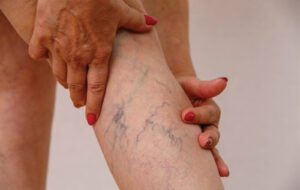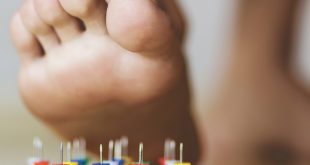 Over the past decade, there has been raised awareness in diagnosing and treating venous insufficiency. It can happen to both men and women, but women have a greater prevalence of the condition. There is evidence that hormonal changes, pregnancy, and lifestyle habits may impact the severity of women’s venous insufficiency. A buildup of excessive pressure on the legs can cause the veins to stop working properly, impeding blood flow and causing blood pooling in the lower extremities. Often, this is related to prolonged sitting or standing.
Over the past decade, there has been raised awareness in diagnosing and treating venous insufficiency. It can happen to both men and women, but women have a greater prevalence of the condition. There is evidence that hormonal changes, pregnancy, and lifestyle habits may impact the severity of women’s venous insufficiency. A buildup of excessive pressure on the legs can cause the veins to stop working properly, impeding blood flow and causing blood pooling in the lower extremities. Often, this is related to prolonged sitting or standing.
A study of venous disease in women looked at the epidemiology and prevalence of the condition. Women, due to many etiologies and risk factors, are particularly prone to venous disease. One main cause of venous disease in women is pregnancy.1
Causes of Vein Disease
The surge of hormones during pregnancy cause a woman’s veins to dilate. After delivery, the veins do shrink in size but not as small as they were prior to pregnancy. Each pregnancy causes a woman’s leg veins to become larger.
Vein disease in women and men is primarily a result of heredity. So, even women that have never been pregnant may also develop venous insufficiency. You can eat right and exercise regularly and still suffer from serious vein problems.
Venous insufficiency is also related to lifestyle choices and work habits. As mentioned, these can include standing or sitting for prolonged periods due to a women’s profession, health, or daily routines. Many times a sedentary lifestyle and obesity may exacerbate vein disease.
Occupations requiring prolonged sitting and standing may lead to venous flow problems. Standing and sitting put more pressure on your veins than walking. It is very important to sit at the proper height. We often sit too high and put pressure on the back of our thighs. We should sit on our “butt bones,” not our thighs. Prolonged pressure on the back of your thighs compresses venous blood outflow and lymphatic fluid outflow. Your knees should be about a ½ inch higher than your hips when sitting down. Most chairs are not adjustable so put a small stool underneath your feet.
How Serious is Venous Insufficiency?
Healthy veins have valves that prevent the backward flow of blood down into your legs. Vein disease is caused by faulty vein valves that allow backward leakage of blood. Backward blood flow causes your veins to enlarge, bulge, and twist resulting in leg symptoms including restless legs. You do NOT have to have bulging varicose veins to have significant, life-style limiting symptoms. Vein disease may or may not be associated with varicose veins, spider veins, skin changes and venous ulcerations, or restless legs and indiscriminately affects between 30–40 million Americans.
Signs and Symptoms Vein Disease:
. Itching
. Heaviness/tiredness
. Aches/pain/tenderness
. Burning
. Cramping
. Night cramping
. Restless legs
. Spider veins — especially below your knees or near your ankles
. Bulging, varicose veins
. Ankle swelling
. Skin discoloration — slight or obvious darkening of your skin near your ankles
. Bleeding veins
. Ulceration
How Can I Be Evaluated for Vein Disease?
Contact Vein911 Vein Treatment Centers to schedule an evaluation. A careful history and physical exam are usually all that is necessary to make an accurate diagnosis. A 30-minute ultrasound exam of your legs is also performed which confirms evidence of vein disease.
Why Should I Choose Vein911?
Patients travel from around the USA and the world to seek the care of Vein911 Vein Treatment Center’s Vein Care Specialists. Vein911 is led by Chris Pittman M.D., FAVLS, FACR, a world-renowned vein care physician leader, providing the highest standard in diagnosis and treatment of vein disease. Vein911 offices are award-winning for both patient and employee satisfaction.
Dr. Pittman is triple board-certified in Venous & Lymphatic Medicine, Interventional Radiology, and Diagnostic Radiology. While many doctors dabble in vein care, we treat only vein patients all day and every day. We have treated thousands of patients just like you. Vein911 succeeds where others fail.
How Does Vein11 Treat Vein Disease?
Ultrasound shows leaking vein valves and guides your non-surgical treatment. There is no role for surgery in vein care. Ultrasound-guided, minimally invasive treatments have revolutionized vein care over the last 15 years. Your vein procedure is virtually painless, takes less than an hour, and there is NO recovery time! Vein-related problems resolve after your leaking veins are treated.
Choosing the Right Vein Care Specialist is Imperative
Not all vein doctors are equal. Modern vein treatment is not a surgical disease and seeing a surgeon or “vascular” surgeon is no guarantee you will receive state-of-the-art vein care. What distinguishes Dr. Pittman from other “vein specialists” is the breadth of experience and skill he has in working with veins. Vein911 customer satisfaction scores far exceed industry averages.
Vein911 Vein Treatment Centers have three convenient locations – South Tampa Near St. Joseph’s Hospital, Clearwater near Mease Countryside Hospital, and Wesley Chapel near Advent Health Wesley Chapel Hospital.
Vein911 Vein Treatment Centers
www.Vein911.com
Don’t Ignore Your Leg Symptoms!
Call Vein911 Today at (855) 201-2558.
References:
1. J L Lohr, Venous disease in women: Epidemiology, manifestations,
and treatment.
 Central Florida Health and Wellness Magazine Health and Wellness Articles of the Villages
Central Florida Health and Wellness Magazine Health and Wellness Articles of the Villages


